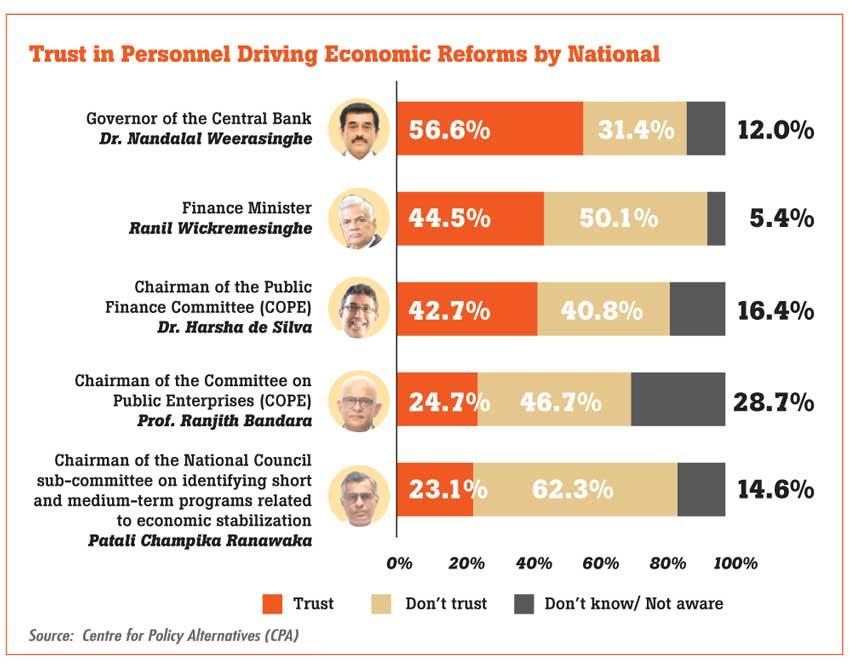02 Dec 2022 - {{hitsCtrl.values.hits}}
Central Bank (CB) Governor Dr. Nandalal Weerasinghe has emerged as the most trusted and the only person commanding the trust of the majority of Sri Lankans to carry out economic reforms in resolving the present economic crisis, according to the ‘Economic Reform Index’ survey conducted by Social Indicator (SI), the survey research arm of the Centre for Policy Alternatives (CPA).
The Survey found that 57 percent of Sri Lankans placed the trust on the CB Governor to do the right thing in resolving the current economic crisis with only 31.4 percent stating no trust on him.

President and Minister of Finance Ranil Wickremesinghe was the second most trusted person (45 percent) to carry out reforms and turnaround the economy.
Meanwhile, the Public Finance Committee (COPF) Chairman Dr. Harsha de Silva emerged as the third most trusted percent (43 percent) and a quarter of Sri Lankans (25 percent) place their trust in the Committee on Public Enterprises (COPE) Chairman Prof. Ranjith Bandara.
The National Council Sub-committee on Identifying Short and Medium-term Programmes related to Economic Stabilisation Chairman Patali Champika Ranawaka is trusted by 23 percent of the population.
Meanwhile, a majority of Sri Lankans (61 percent) approved of the government approaching the IMF
to overcome the country’s economic crisis and three quarters of Sri Lankans (75 percent) believed that the IMF assistance would enable the country overcome the current economic crisis.
Notably, one-fifth of Sri Lankans was very optimistic about this approach.
Interestingly, most Sri Lankans (37 percent) believed that China would assist Sri Lanka in overcoming the economic disaster.
Almost one fourth of Sri Lankans (24 percent) were of the view that India would assist Sri Lanka and 14 percent believed that Japan would assist to overcome the economic crisis. However, only less than 10 percent of Sri Lankans think either the United States (U.S.) or European countries would assist Sri Lanka to overcome the economic crisis.
In terms of economic policies, the survey findings indicated that over half of Sri Lankans (56 percent) were of the belief that the government should allow foreign companies to invest in the country.
Although the majority of the population (50.1 percent) supported reducing number of public employees, they were against (52.1 percent) privatisations of government corporations. Meanwhile, nearly 64 percent Sri Lankans disapproved the tax hikes through the Inland Revenue Amendment Bill. However, 35 percent of the population was not aware of the Amendment.
According to the survey findings, 41 percent of Sri Lankans expressed their pessimism towards
Sri Lanka’s economic future. Specially those who are in the age bracket of 30 and above expressed a high rate of pessimism towards the country’s economic future.
Those who engaged in self-employment and in the private sector harbor relatively higher levels of pessimistic views on the country’s economic future. It was only 18 percent of people who believed that the country’s economic situation would improve in a year. Meanwhile, about 60 percent of Sri Lankans were considering to migrate to another country if they were given an opportunity. An overwhelming 79 percent of Sri Lankans claimed that their economic situation has got worse compared to what it was a year ago. 82 percent indicated that their quality in consumption or purchase of food items have altered as a result of the economic crisis. The island-wide survey examined public opinion on the current economy, and economic reforms discussed over the past few months. The fieldwork for the study was conducted from October 21 to October 31, 2022.
06 Nov 2024 1 hours ago
06 Nov 2024 2 hours ago
05 Nov 2024 05 Nov 2024
05 Nov 2024 05 Nov 2024
05 Nov 2024 05 Nov 2024